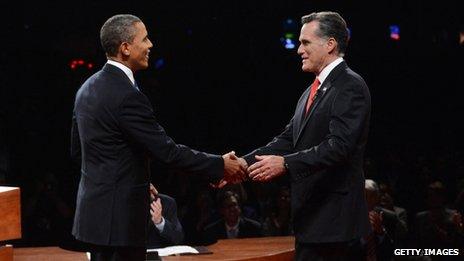Romney wins debate, but watch the polls
- Published

Before this debate there was lots of talk of zingers. In the end, Romney and Obama almost zinged past each other.
The three men on the red carpet - the two candidates at their pulpits, and the moderator Jim Lehrer sitting at his over-large desk - all seemed to have a different conception of what the debate should be like, as if they were each playing a different sport on the same field. Romney was playing American football, Obama cricket and Lehrer tiddlywinks.
Those who bemoan the lack of substance in modern politics can't complain about this debate.
Figures flew past at a dizzying speed. But the details are complex, and to follow the argument you would not only have to have an extremely good grasp of the various subjects, from taxation to bank regulation, but an excellent memory as well. It might have been ennobling but I am not sure how enlightening it will have been to the average voter.
But as theatre, a battle of image and confidence, Mitt Romney was the clear winner. He had obviously practised so hard and so long that he was nearly hoarse. But not quite. Instead his voice was a touch deeper. No bad thing.
He looked Mr Obama in the eyes as he interrupted with animation, overriding the moderator, insisting on a comeback. He didn't seem rude. He did seem in command and to be enjoying the scrap.
President Obama on the other hand looked as though he'd much rather be out celebrating his wedding anniversary with his wife. He started out looking very nervous, swallowing hard, not the confident performer we are used to seeing.
Watch the polls
He warmed up and got into his stride but that meant he ended up giving overlong, mini-lectures straight to camera rather than engaging, arguing. He seemed unwilling to actually enter a debate with his opponent, and missed a few obvious openings when he could have attacked Mitt Romney.
I am sure a few Democratic strategists at home would have been swearing at the TV like football fans angry at a missed goal. But my colleague Dick Meyer, the executive producer of BBC America, has some words of caution:
Students in New York were split over who came out on top
"Obama and his campaign are very disciplined and research-driven. There may well be a very intentional plan to keep Obama low-key, low-rhetoric, wonky and prosaic. They are looking at achieving more than media spin. And this debate is essentially a monotone, no fireworks, no mongo-gaffes, no crack-them-up funny lines and no big margins."
This makes sense, but I think Mr Obama took the tactic too much to heart, allowing his opponent to shine while he almost appeared remote and uninterested.
Republicans certainly feel that they have used the debate to shift the perception of their candidate, shake up the etch-a-sketch and talk about his passion for job creation and focus on the middle classes.
And amazingly neither the president nor the moderator mentioned that 47% video.
The debate has turned out to be very important, simply because, at least at the time of writing, commentators almost all agree Mitt Romney won.
The next string of opinion polls could hardly matter more. If they narrow or he starts moving ahead of Mr Obama, that will be a huge boost for his campaign, and suggest he could win the White House. However if after an acclaimed victory the opinion polls hardly budge, then it would mean he is in a very serious hole indeed.